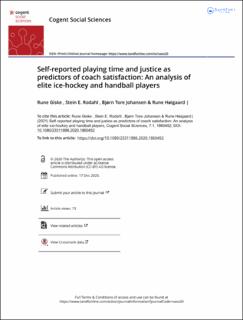| dc.contributor.author | Giske, Rune | |
| dc.contributor.author | Rodahl, Stein Edgar | |
| dc.contributor.author | Johansen, Bjørn Tore | |
| dc.contributor.author | Høigaard, Rune | |
| dc.date.accessioned | 2021-03-01T13:26:56Z | |
| dc.date.available | 2021-03-01T13:26:56Z | |
| dc.date.created | 2020-12-28T17:40:59Z | |
| dc.date.issued | 2020 | |
| dc.identifier.citation | Giske, R., Rodahl, S. E., Johansen, B. T. & Høigaard, R. Self-reported playing time and justice as predictors of coach satisfaction: An analysis of elite ice-hockey and handball players. Cogent Social Sciences, 7(1): 1860452. doi: | en_US |
| dc.identifier.issn | 2331-1886 | |
| dc.identifier.uri | https://hdl.handle.net/11250/2730957 | |
| dc.description.abstract | Intrateam competition for specific roles and playing time is a continuous imperative process in elite sport teams. The assessment of this competition is done by the coach and the outcome of this process has a significant impact on the team and the players. The following hypothesis was put forward for testing: Self-reported playing time and perceptions of justice among elite ice-hockey and handball players predict their satisfaction with the coach. Elite ice-hockey and handball players (N = 231) reported playing time and completed the Perceived Justice and Athlete Satisfaction Questionnaires. Hierarchical multiple regression analyses show that self-reported playing time, distributive justice, and procedural justice explains 41% to 45% of the variance in the dependent variable of satisfaction with a coach, thereby confirming the hypothesis. Self-reported playing time does not explain as much as the justice variables. The results complement earlier research showing that training and instructions as well as positive feedback were strong determinants of satisfaction with leadership. In an elite team setting perceived justice emerges as an important predictor coach satisfaction and the management of intrateam positional competition is therefore an important leadership task to consider. Moreover, coaches allocating limited resources among players should reflect on the justice criteria these decisions are based on if satisfaction with the coach is at stake. | en_US |
| dc.language.iso | eng | en_US |
| dc.publisher | Taylor & Francis | en_US |
| dc.rights | Navngivelse 4.0 Internasjonal | * |
| dc.rights.uri | http://creativecommons.org/licenses/by/4.0/deed.no | * |
| dc.title | Self-reported playing time and justice as predictors of coach satisfaction : An analysis of elite ice-hockey and handball players | en_US |
| dc.type | Peer reviewed | en_US |
| dc.type | Journal article | en_US |
| dc.description.version | publishedVersion | en_US |
| dc.rights.holder | © 2020 The Author(s) | en_US |
| dc.subject.nsi | VDP::Samfunnsvitenskap: 200::Samfunnsvitenskapelige idrettsfag: 330 | en_US |
| dc.source.pagenumber | 12 | en_US |
| dc.source.volume | 7 | en_US |
| dc.source.journal | Cogent Social Sciences | en_US |
| dc.source.issue | 1 | en_US |
| dc.identifier.doi | 10.1080/23311886.2020.1860452 | |
| dc.identifier.cristin | 1863612 | |
| dc.source.articlenumber | 1860452 | en_US |

